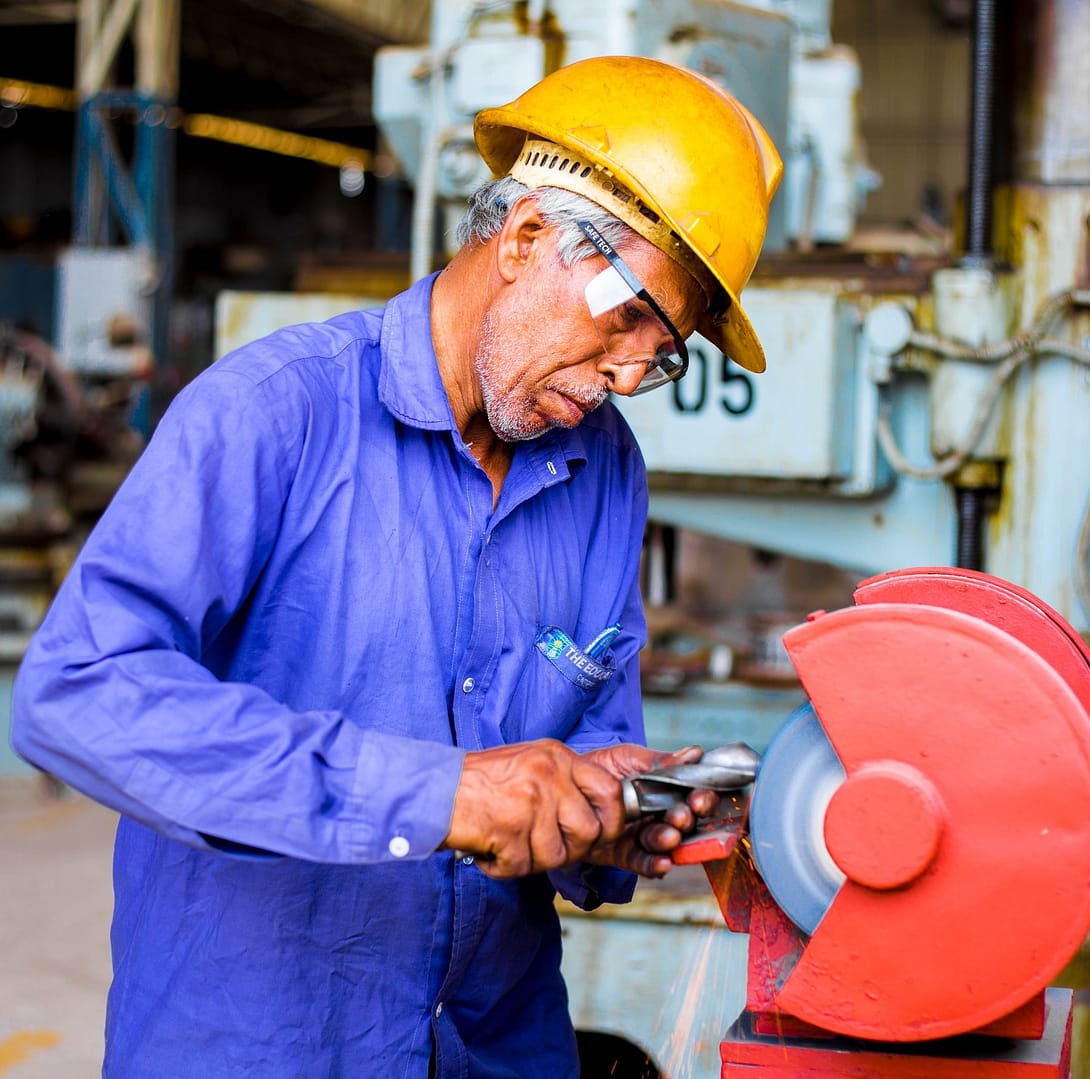In today’s ever-evolving workforce, one demographic has been steadily gaining prominence – the elderly workforce. As our population ages, more and more older individuals are choosing to extend their careers or re-enter the job market after retirement. This trend has sparked important discussions about how to ensure the safety and well-being of older workers. In this article, we will explore safety measures for a more elderly workforce, discussing the unique challenges they face, the risks involved, and the steps that can be taken to protect their health and welfare as well as the steps to take when making an accident at work claim.
Understanding the Challenges
The Aging Workforce – A Growing Trend
The first step in addressing safety measures for an elderly workforce is acknowledging the undeniable reality – our workforce is getting older. According to data from the UK, the proportion of workers aged 50 and over has been steadily increasing over the years. This demographic shift brings with it a set of unique challenges that need to be addressed.
Physical Limitations
One of the primary challenges faced by older workers is the gradual decline in physical capabilities. As individuals age, their strength, agility, and endurance can diminish. This can make tasks that were once routine more difficult and increase the risk of accidents or injuries.
Declining Sensory Abilities
Another factor to consider is the natural decline in sensory abilities that often accompanies aging. Vision, hearing, and proprioception (awareness of one’s body in space) may all deteriorate over time. These sensory changes can affect an individual’s ability to detect hazards and respond to them effectively.
Chronic Health Conditions
Older workers are also more likely to have chronic health conditions, such as arthritis, diabetes, or heart disease. These conditions can exacerbate the physical challenges they face and increase the likelihood of accidents on the job.
Fatigue
While older workers may have a wealth of experience and knowledge, they may also experience fatigue more quickly than their younger counterparts. Longer recovery times and reduced stamina can make it challenging for them to maintain a high level of alertness and performance throughout the workday.
Identifying the Risks
The Consequences of Inaction
Failing to address the unique challenges faced by an aging workforce can have severe consequences. Workplace accidents and injuries can result in physical pain, emotional distress, and financial hardship for older workers and their families. Moreover, businesses may suffer from reduced productivity, increased absenteeism, and higher insurance costs.
Increased Risk of Accidents
Without appropriate safety measures, older workers are at an increased risk of accidents and injuries. For example, a construction worker in their 60s may find it more challenging to balance on scaffolding or lift heavy objects safely. In contrast, a 30-year-old worker might complete the same tasks with ease.
Reduced Job Satisfaction
When older workers perceive their workplaces as unsafe or unaccommodating, it can lead to reduced job satisfaction. This, in turn, can impact morale and productivity, potentially creating a negative work environment.
High Turnover Costs
The turnover of experienced older workers can be costly for businesses. Replacing them often requires recruiting, training, and onboarding new employees, which incurs additional expenses. It’s in the best interest of both employers and employees to retain experienced older workers as long as possible.
Implementing Safety Measures
A Holistic Approach
To address the safety needs of an elderly workforce effectively, businesses must take a holistic approach that considers the unique challenges and risks involved. Here are some key strategies to enhance workplace safety for older workers:
Training and Education
Comprehensive training and education programs are essential for all employees, but they are especially vital for older workers. These programs should cover not only job-specific skills but also safety protocols and hazard awareness. Providing ongoing training can help older workers stay updated on the latest safety measures and technology.
Ergonomic Adjustments
Making ergonomic adjustments to the workplace can significantly improve safety for older workers. This might include providing ergonomic chairs, height-adjustable workstations, and tools designed to reduce strain and fatigue. These adjustments can help alleviate physical discomfort and enhance productivity.
Regular Health Assessments
Regular health assessments can help identify potential health issues that may affect older workers’ ability to perform their job safely. Employers can collaborate with healthcare professionals to provide routine check-ups and screenings, ensuring that any emerging health concerns are addressed promptly.
Flexible Work Arrangements
Offering flexible work arrangements, such as part-time schedules or job-sharing options, can enable older workers to continue contributing to the workforce while managing their physical limitations and health needs.
Inclusive Safety Policies
Creating inclusive safety policies that take into account the needs of older workers is crucial. Employers should encourage open communication and feedback from employees of all ages, allowing them to voice safety concerns and suggest improvements.
Personal Protective Equipment (PPE)
Providing appropriate personal protective equipment (PPE) is essential to safeguarding older workers. PPE should be tailored to the specific needs of the individual and the job they perform. For example, hearing protection and safety glasses may be necessary for those with sensory impairments.
Supportive Work Culture
Fostering a supportive work culture that values and respects older workers is vital. Employers should celebrate the experience and wisdom that older employees bring to the table, creating an environment where all employees feel valued and included.
Making an Accident at Work Claim with National Claims
Now, let’s shift our focus to addressing what to do when accidents do happen despite all safety measures. Accidents at work can be devastating, especially for elderly workers. If you or a loved one has experienced a workplace accident, you may be entitled to compensation, and that’s where National Claims steps in to help.
National Claims is a leading provider of legal assistance for workplace accident claims in the UK. We understand the unique challenges that older workers face and are committed to helping them navigate the claims process smoothly. Here’s how you can make an accident at work claim with National Claims:
Contact Us: The first step is to get in touch with our experienced team. You can reach us through our website or give us a call. Our friendly staff will guide you through the initial steps and gather essential information about your case.
Free Consultation: We offer a free, no-obligation consultation to discuss the details of your workplace accident. During this consultation, we will assess the merits of your claim and provide you with expert legal advice.
Dedicated Legal Team: If your claim is viable, we will pass you over to one of our solicitors on our panel to handle your case. They will work diligently to build a strong case on your behalf.
Evidence Collection: To strengthen your claim, our team will gather evidence, including witness statements, medical records, and any other relevant documentation. We leave no stone unturned to ensure that your case is well-supported.
No Win, No Fee: At National Claims, we operate on a “No Win, No Fee” basis. This means that you won’t have to worry about upfront legal fees. We only get paid if your claim is successful, making our services accessible to everyone.
Peace of Mind: Our clients’ well-being is our top priority. We understand the physical, emotional, and financial toll that workplace accidents can take on individuals and their families. With National Claims by your side, you can focus on your recovery while we handle the legal aspects of your claim.

Conclusion
As our workforce continues to age, it is imperative that we prioritize safety measures for older workers. The challenges they face, including physical limitations, sensory changes, and chronic health conditions, necessitate a proactive approach to workplace safety. Identifying and addressing the risks involved, such as an increased risk of accidents and reduced job satisfaction, can lead to a safer and more productive work environment.
By implementing a holistic approach that includes training and education, ergonomic adjustments, regular health assessments, flexible work arrangements, inclusive safety policies, and appropriate PPE, businesses can create a workplace that supports the well-being and longevity of older workers. Additionally, fostering a supportive work culture that values the contributions of all employees, regardless of age, is essential for creating a harmonious and thriving work environment.
In conclusion, safety measures for a more elderly workforce are not only a moral imperative but also a strategic investment in the success and sustainability of businesses. Recognizing the value of older workers and taking proactive steps to ensure their safety is a win-win for employees and employers alike. It is through these measures that we can truly improve safety for the elderly in the workforce and create a workplace that embraces the diversity of experience and age.
And remember, should the unfortunate happen, National Claims is here to support and guide you through the process of making an accident at work claim, ensuring that you receive the compensation you deserve for any workplace injuries or accidents. Your safety and well-being are our top priorities, and we are committed to advocating for your rights every step of the way.
Contact us today to get started on your claim and to find out more about how we deal with accidents at work.
Click below to see why we are one of the most trusted claims management companies in the UK.

We’re proud of our excellent customer reviews
We thrive on delivering exceptional service and ensuring our clients’ satisfaction. Don’t just take our word for it. Check out some of our independent reviews to see what our clients have to say.
Excellent

This firm is excellent, they sorted out my car pay out and injury claim very fast, they always communicate with you all the time.

My accident case was dealt with confidence and with great result of the outcome, especially James kept me informed all the time.

I was very impressed at the way my inquiry was treated. I was listened to attentively and everything I needed to know was explained to me.






